Springer Series in Statistics
Advisors:
P. Bickel, P. Diggle, S. Fienberg, U. Gather,
I. Olkin, S. Zeger
�
Springer Series in Statistics
Alho/Spencer: Statistical Demography and Forecasting.
Andersen/Borgan/Gill/Keiding: Statistical Models Based on Counting Processes.
Atkinson/Riani: Robust Diagnostic Regression Analysis.
Atkinson/Riani/Cerioli: Exploring Multivariate Data with the Forward Search.
Berger: Statistical Decision Theory and Bayesian Analysis, 2nd edition.
Borg/Groenen: Modern Multidimensional Scaling: Theory and Applications,
2nd edition.
Brockwell/Davis: Time Series: Theory and Methods, 2nd edition.
Bucklew: Introduction to Rare Event Simulation.
Cappé/Moulines/Rydén: Inference in Hidden Markov Models.
Chan/Tong: Chaos: A Statistical Perspective.
Chen/Shao/Ibrahim: Monte Carlo Methods in Bayesian Computation.
Coles: An Introduction to Statistical Modeling of Extreme Values.
David/Edwards: Annotated Readings in the History of Statistics.
Devroye/Lugosi: Combinatorial Methods in Density Estimation.
Efromovich: Nonparametric Curve Estimation: Methods, Theory, and Applications.
Eggermont/LaRiccia: Maximum Penalized Likelihood Estimation, Volume I: Density
Fahrmeir/Tutz: Multivariate Statistical Modelling Based on Generalized Linear
Fan/Yao: Nonlinear Time Series: Nonparametric and Parametric Methods.
Farebrother: Fitting Linear Relationships: A History of the Calculus of Observations
Federer: Statistical Design and Analysis for Intercropping Experiments, Volume I:
Federer: Statistical Design and Analysis for Intercropping Experiments, Volume II:
Estimation.
Models, 2nd edition.
1750-1900.
Two Crops.
Three or More Crops.
and Implementation
Ferraty/Vieu: Nonparametric Functional Data Analysis: Models, Theory, Applications,
Ghosh/Ramamoorthi: Bayesian Nonparametrics.
Glaz/Naus/Wallenstein: Scan Statistics.
Good: Permutation Tests: Parametric and Bootstrap Tests of Hypotheses, 3rd edition.
Gouriéroux: ARCH Models and Financial Applications.
Gu: Smoothing Spline ANOVA Models.
Györfi/Kohler/Krzyz•ak/Walk: A Distribution-Free Theory of Nonparametric
Regression.
Haberman: Advanced Statistics, Volume I: Description of Populations.
Hall: The Bootstrap and Edgeworth Expansion.
Härdle: Smoothing Techniques: With Implementation in S.
Harrell: Regression Modeling Strategies: With Applications to Linear Models, Logistic
Regression, and Survival Analysis.
Hart: Nonparametric Smoothing and Lack-of-Fit Tests.
Hastie/Tibshirani/Friedman: The Elements of Statistical Learning: Data Mining,
Inference, and Prediction.
Hedayat/Sloane/Stufken: Orthogonal Arrays: Theory and Applications.
Heyde: Quasi-Likelihood and its Application: A General Approach to Optimal
Parameter Estimation.
(continued after index)
�
Rahul Mukerjee
C.F. Jeff Wu
A Modern Theory of
Factorial Designs
�
Rahul Mukerjee
Indian Institute of Management
Calcutta
Joka, Diamond Harbour Road
Kolkata 700 104
India
rmuk@iimcal.ac.in
C.F. Jeff Wu
School of Industrial and Systems Engineering
Georgia Institute of Technology
Atlanta, GA 30332-0205
USA
jeffwu@isye.gatech.edu
Library of Congress Control Number: 2005939038
ISBN-10: 0-387-31991-3
ISBN-13: 978-0387-31991-9
Printed on acid-free paper.
© 2006 Springer Science+Business Media, Inc.
All rights reserved. This work may not be translated or copied in whole or in part without the
written permission of the publisher (Springer Science+Business Media, Inc., 233 Springer
Street, New York, NY 10013, USA), except for brief excerpts in connection with reviews or
scholarly analysis. Use in connection with any form of information storage and retrieval, elec-
tronic adaptation, computer software, or by similar or dissimilar methodology now known or
hereafter developed is forbidden.
The use in this publication of trade names, trademarks, service marks, and similar terms, even
if they are not identified as such, is not to be taken as an expression of opinion as to whether
or not they are subject to proprietary rights.
Printed in the United States of America.
(MVY)
9 8 7 6 5 4 3 2 1
springer.com
�
To my father and wife,
and to the memory of my mother, RM
To my wife, CFJW
�
Springer Series in Statistics
(continued from p. ii)
Huet/Bouvier/Poursat/Jolivet: Statistical Tools for Nonlinear Regression: A Practical
Guide with S-PLUS and R Examples, 2nd edition.
Ibrahim/Chen/Sinha: Bayesian Survival Analysis.
Jolliffe: Principal Component Analysis, 2nd edition.
Knottnerus: Sample Survey Theory: Some Pythagorean Perspectives.
Kolen/Brennan: Test Equating: Methods and Practices.
Kotz/Johnson (Eds.): Breakthroughs in Statistics Volume I.
Kotz/Johnson (Eds.): Breakthroughs in Statistics Volume II.
Kotz/Johnson (Eds.): Breakthroughs in Statistics Volume III.
Küchler/Sørensen: Exponential Families of Stochastic Processes.
Kutoyants: Statistical Influence for Ergodic Diffusion Processes.
Lahiri: Resampling Methods for Dependent Data.
Le Cam: Asymptotic Methods in Statistical Decision Theory.
Le Cam/Yang: Asymptotics in Statistics: Some Basic Concepts, 2nd edition.
Liu: Monte Carlo Strategies in Scientific Computing.
Longford: Models for Uncertainty in Educational Testing.
Manski: Partial Identification of Probability Distributions.
Mielke/Berry: Permutation Methods: A Distance Function Approach.
Molenberghs/Verbeke: Models for Discrete Longitudinal Data.
Mukerjee/Wu: A Modern Theory of Factorial Designs.
Nelsen: An Introduction to Copulas. 2nd edition
Pan/Fang: Growth Curve Models and Statistical Diagnostics.
Parzen/Tanabe/Kitagawa: Selected Papers of Hirotugu Akaike.
Politis/Romano/Wolf: Subsampling.
Ramsay/Silverman: Applied Functional Data Analysis: Methods and Case Studies.
Ramsay/Silverman: Functional Data Analysis, 2nd edition.
Rao/Toutenburg: Linear Models: Least Squares and Alternatives.
Reinsel: Elements of Multivariate Time Series Analysis. 2nd edition.
Rosenbaum: Observational Studies, 2nd edition.
Rosenblatt: Gaussian and Non-Gaussian Linear Time Series and Random Fields.
Särndal/Swensson/Wretman: Model Assisted Survey Sampling.
Santner/Williams/Notz: The Design and Analysis of Computer Experiments.
Schervish: Theory of Statistics.
Shao/Tu: The Jackknife and Bootstrap.
Simonoff: Smoothing Methods in Statistics.
Singpurwalla and Wilson: Statistical Methods in Software Engineering: Reliability and
Risk.
Small: The Statistical Theory of Shape.
Sprott: Statistical Inference in Science.
Stein: Interpolation of Spatial Data: Some Theory for Kriging.
Taniguchi/Kakizawa: Asymptotic Theory of Statistical Inference for Time Series.
Tanner: Tools for Statistical Inference: Methods for the Exploration of Posterior
Distributions and Likelihood Functions, 3rd edition.
Tillé: Sampling Algorithms.
van der Laan: Unified Methods for Censored Longitudinal Data and Causality.
van der Vaart/Wellner: Weak Convergence and Empirical Processes: With Applications
to Statistics.
Verbeke/Molenberghs: Linear Mixed Models for Longitudinal Data.
Weerahandi: Exact Statistical Methods for Data Analysis.
West/Harrison: Bayesian Forecasting and Dynamic Models, 2nd edition.
�
To my father and wife, and to
the memory of my mother, RM
To my wife, CFJW
�
Preface
Factorial design has always played a prominent role in the theory and prac-
tice of experimental design. It allows efficient and economic experimentation
with multiple input variables and has been successfully used in a wide range
of applications. Much research has been done and texts have been written
on factorial design in the 70 years since its inception. For economic reasons,
fractional factorials have been extremely popular, especially when the number
of factors is large and the runs are expensive. The first and perhaps the most
important issue faced by experimenters is the choice of a fractional factorial
design. Given the long history of factorial design, an “optimality” theory for
design selection should have emerged long ago. Surprisingly, the first serious
attempt in this direction was made only in the early sixties with the notion of
resolution. It became apparent later that this notion was not discriminating
as a criterion for design selection. Equally surprisingly, it took almost another
20 years to see the birth of the minimum aberration (MA) criterion, which
has since become the major criterion for selecting fractional factorial designs.
Once the importance of the MA criterion was recognized in the late eighties,
research on the theory and algorithms for finding MA and related designs
has grown rapidly in the last 15 years. Besides building and improving upon
existing techniques in projective geometry and coding theory, such research
has led to the development of novel techniques like complementary designs
and efficient search algorithms. Factorial designs with increasing complexity
in the underlying structure (e.g., mixed-levels, blocking, split-plots, and ro-
bust parameter design) have also received considerable attention. A detailed
description of this history and an account of the nature and contents of the
book appear in Chapter 1.
In 2000, the present authors felt that the time was ripe to start planning
and writing a modern book on factorial designs with the MA perspective. Such
a book should contain the major theoretical tools and results, and tables of
optimal or efficient designs available in the literature. It took several visits by
RM to CFJW at the Department of Statistics, University of Michigan, and
later at the School of Industrial and Systems Engineering, Georgia Institute
�
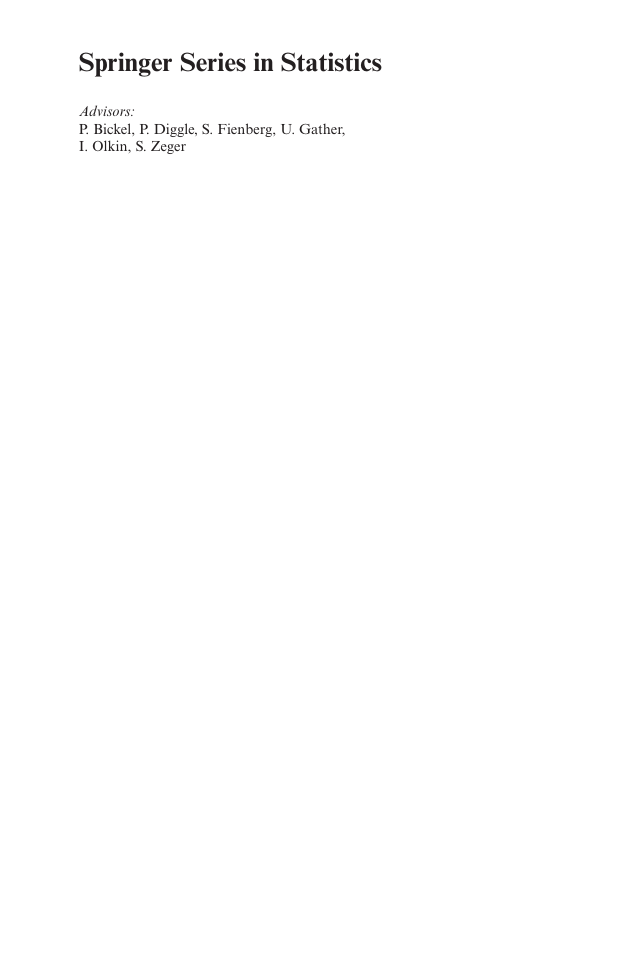
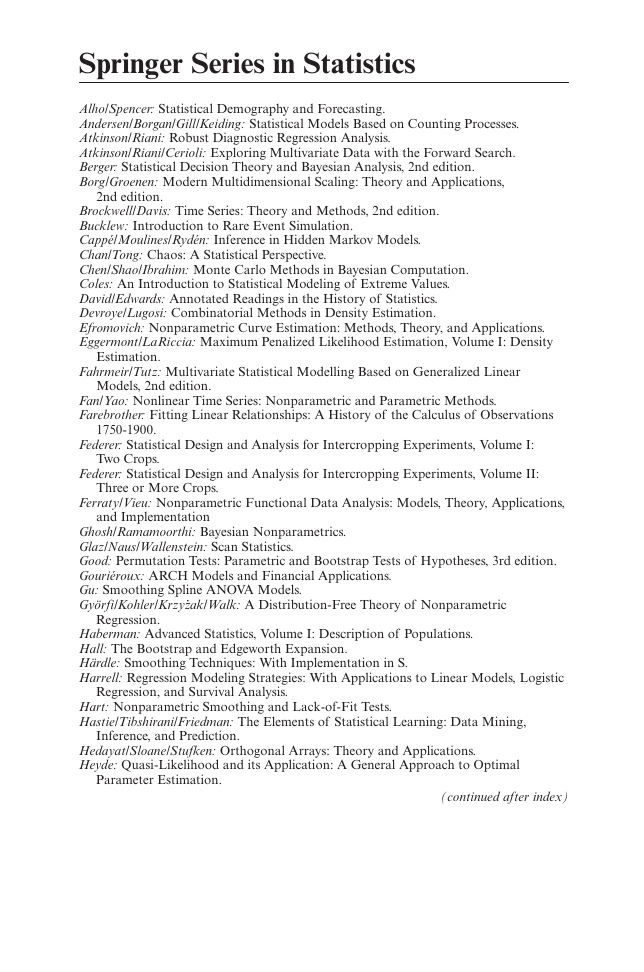
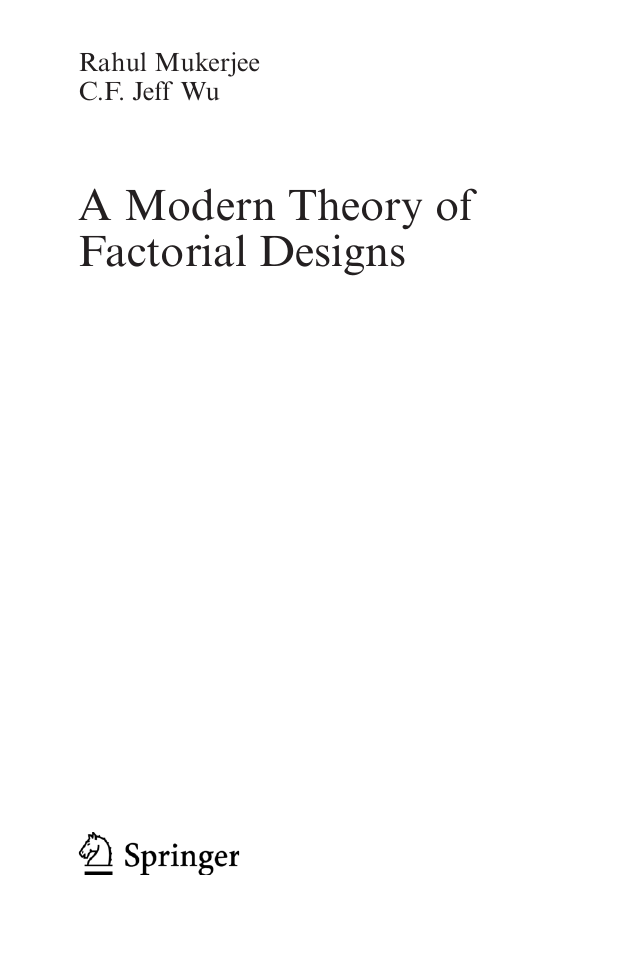
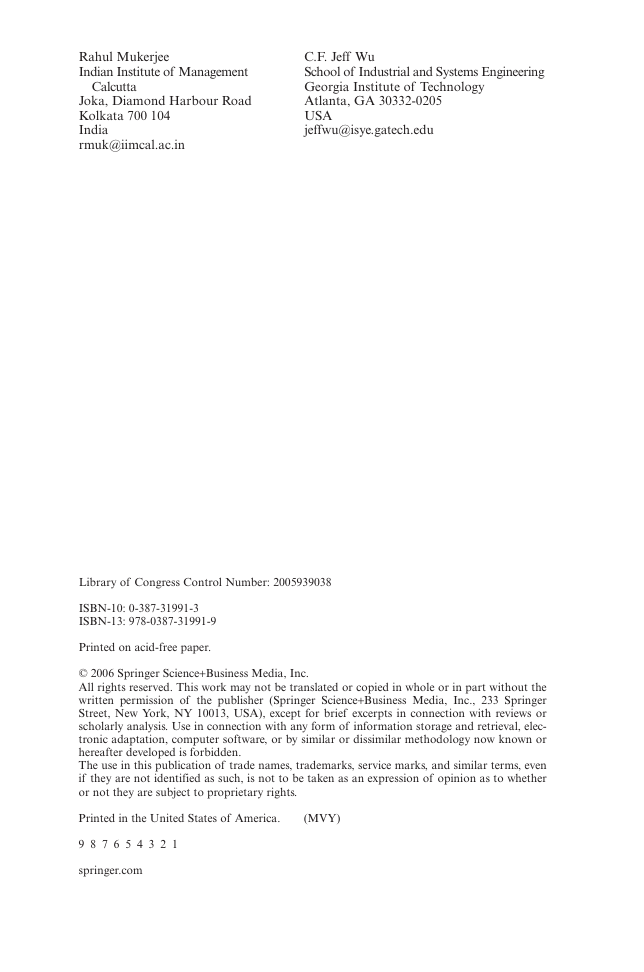
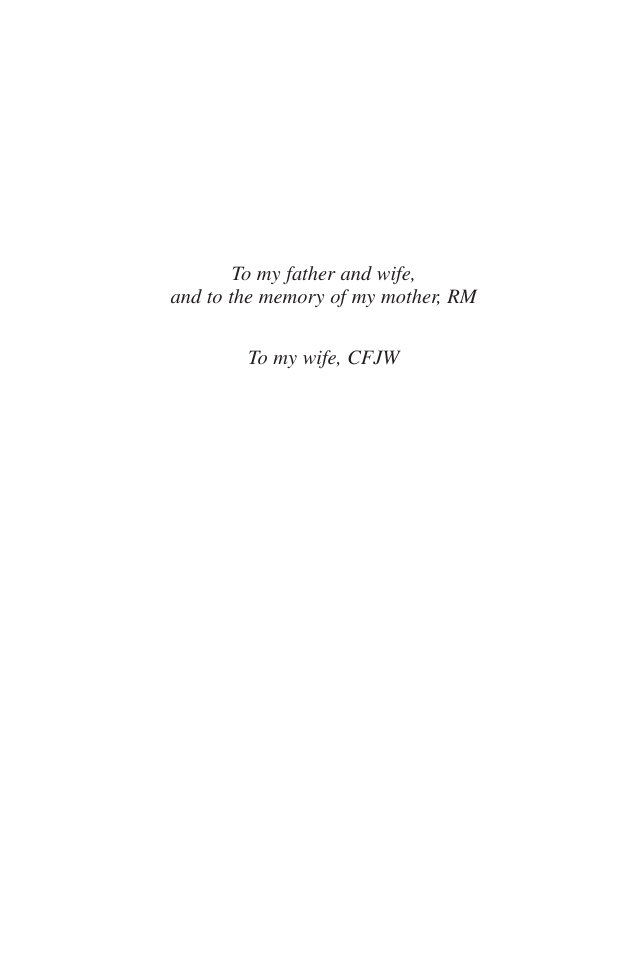
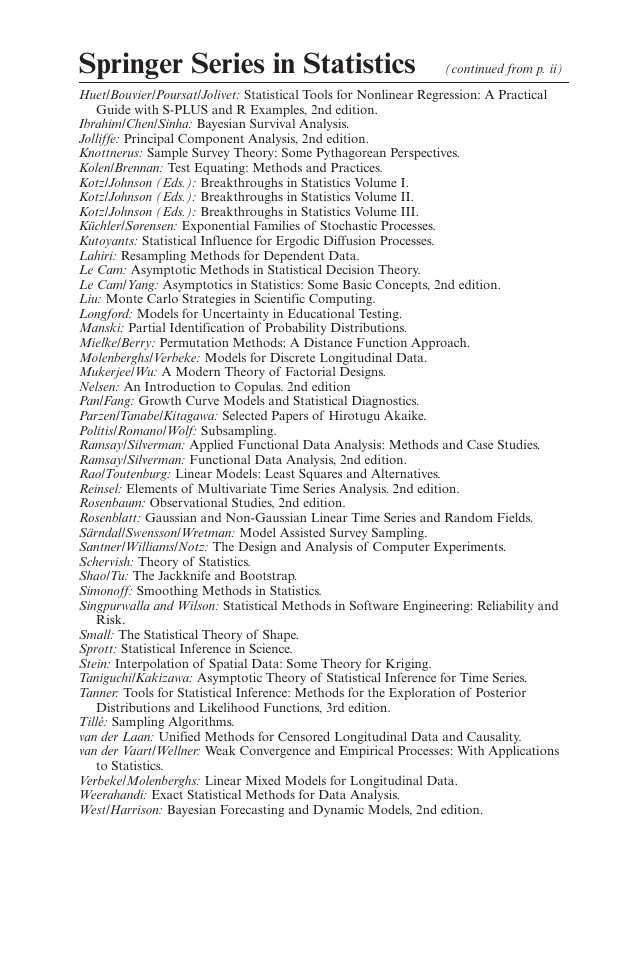
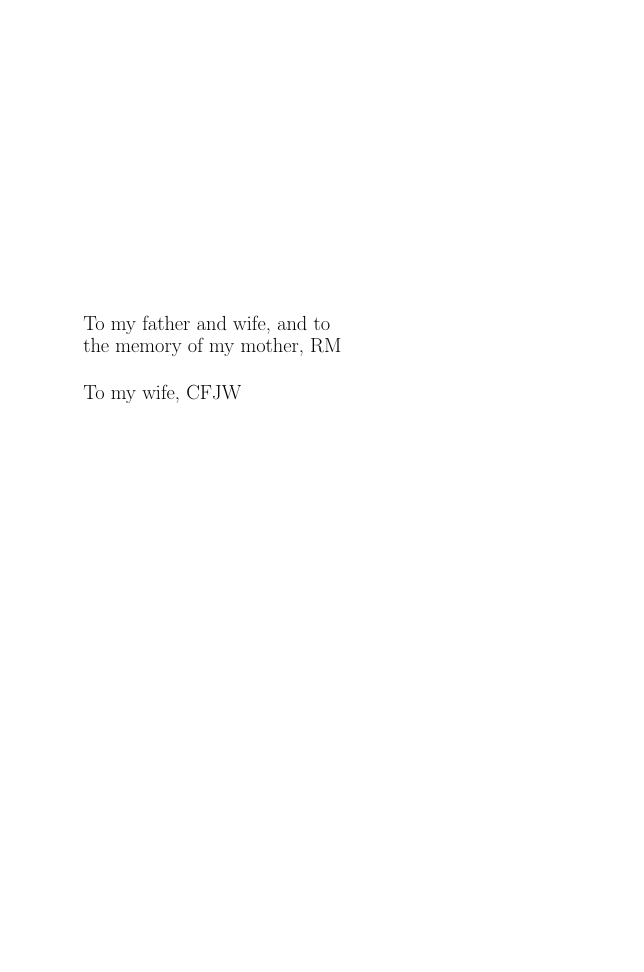
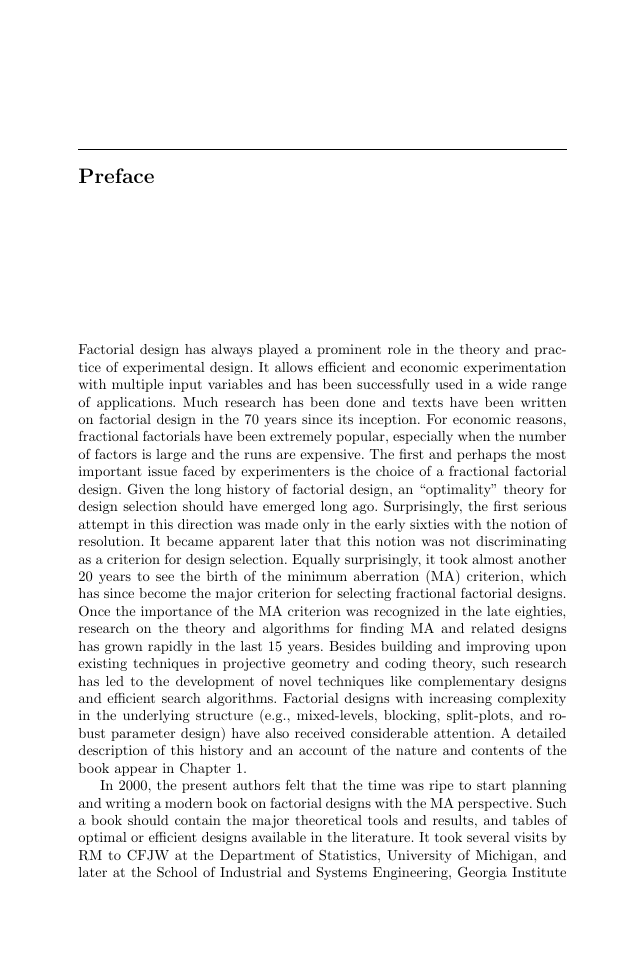








 2023年江西萍乡中考道德与法治真题及答案.doc
2023年江西萍乡中考道德与法治真题及答案.doc 2012年重庆南川中考生物真题及答案.doc
2012年重庆南川中考生物真题及答案.doc 2013年江西师范大学地理学综合及文艺理论基础考研真题.doc
2013年江西师范大学地理学综合及文艺理论基础考研真题.doc 2020年四川甘孜小升初语文真题及答案I卷.doc
2020年四川甘孜小升初语文真题及答案I卷.doc 2020年注册岩土工程师专业基础考试真题及答案.doc
2020年注册岩土工程师专业基础考试真题及答案.doc 2023-2024学年福建省厦门市九年级上学期数学月考试题及答案.doc
2023-2024学年福建省厦门市九年级上学期数学月考试题及答案.doc 2021-2022学年辽宁省沈阳市大东区九年级上学期语文期末试题及答案.doc
2021-2022学年辽宁省沈阳市大东区九年级上学期语文期末试题及答案.doc 2022-2023学年北京东城区初三第一学期物理期末试卷及答案.doc
2022-2023学年北京东城区初三第一学期物理期末试卷及答案.doc 2018上半年江西教师资格初中地理学科知识与教学能力真题及答案.doc
2018上半年江西教师资格初中地理学科知识与教学能力真题及答案.doc 2012年河北国家公务员申论考试真题及答案-省级.doc
2012年河北国家公务员申论考试真题及答案-省级.doc 2020-2021学年江苏省扬州市江都区邵樊片九年级上学期数学第一次质量检测试题及答案.doc
2020-2021学年江苏省扬州市江都区邵樊片九年级上学期数学第一次质量检测试题及答案.doc 2022下半年黑龙江教师资格证中学综合素质真题及答案.doc
2022下半年黑龙江教师资格证中学综合素质真题及答案.doc